Sallie Mae 2009 Annual Report Download - page 254
Download and view the complete annual report
Please find page 254 of the 2009 Sallie Mae annual report below. You can navigate through the pages in the report by either clicking on the pages listed below, or by using the keyword search tool below to find specific information within the annual report.-
 1
1 -
 2
2 -
 3
3 -
 4
4 -
 5
5 -
 6
6 -
 7
7 -
 8
8 -
 9
9 -
 10
10 -
 11
11 -
 12
12 -
 13
13 -
 14
14 -
 15
15 -
 16
16 -
 17
17 -
 18
18 -
 19
19 -
 20
20 -
 21
21 -
 22
22 -
 23
23 -
 24
24 -
 25
25 -
 26
26 -
 27
27 -
 28
28 -
 29
29 -
 30
30 -
 31
31 -
 32
32 -
 33
33 -
 34
34 -
 35
35 -
 36
36 -
 37
37 -
 38
38 -
 39
39 -
 40
40 -
 41
41 -
 42
42 -
 43
43 -
 44
44 -
 45
45 -
 46
46 -
 47
47 -
 48
48 -
 49
49 -
 50
50 -
 51
51 -
 52
52 -
 53
53 -
 54
54 -
 55
55 -
 56
56 -
 57
57 -
 58
58 -
 59
59 -
 60
60 -
 61
61 -
 62
62 -
 63
63 -
 64
64 -
 65
65 -
 66
66 -
 67
67 -
 68
68 -
 69
69 -
 70
70 -
 71
71 -
 72
72 -
 73
73 -
 74
74 -
 75
75 -
 76
76 -
 77
77 -
 78
78 -
 79
79 -
 80
80 -
 81
81 -
 82
82 -
 83
83 -
 84
84 -
 85
85 -
 86
86 -
 87
87 -
 88
88 -
 89
89 -
 90
90 -
 91
91 -
 92
92 -
 93
93 -
 94
94 -
 95
95 -
 96
96 -
 97
97 -
 98
98 -
 99
99 -
 100
100 -
 101
101 -
 102
102 -
 103
103 -
 104
104 -
 105
105 -
 106
106 -
 107
107 -
 108
108 -
 109
109 -
 110
110 -
 111
111 -
 112
112 -
 113
113 -
 114
114 -
 115
115 -
 116
116 -
 117
117 -
 118
118 -
 119
119 -
 120
120 -
 121
121 -
 122
122 -
 123
123 -
 124
124 -
 125
125 -
 126
126 -
 127
127 -
 128
128 -
 129
129 -
 130
130 -
 131
131 -
 132
132 -
 133
133 -
 134
134 -
 135
135 -
 136
136 -
 137
137 -
 138
138 -
 139
139 -
 140
140 -
 141
141 -
 142
142 -
 143
143 -
 144
144 -
 145
145 -
 146
146 -
 147
147 -
 148
148 -
 149
149 -
 150
150 -
 151
151 -
 152
152 -
 153
153 -
 154
154 -
 155
155 -
 156
156 -
 157
157 -
 158
158 -
 159
159 -
 160
160 -
 161
161 -
 162
162 -
 163
163 -
 164
164 -
 165
165 -
 166
166 -
 167
167 -
 168
168 -
 169
169 -
 170
170 -
 171
171 -
 172
172 -
 173
173 -
 174
174 -
 175
175 -
 176
176 -
 177
177 -
 178
178 -
 179
179 -
 180
180 -
 181
181 -
 182
182 -
 183
183 -
 184
184 -
 185
185 -
 186
186 -
 187
187 -
 188
188 -
 189
189 -
 190
190 -
 191
191 -
 192
192 -
 193
193 -
 194
194 -
 195
195 -
 196
196 -
 197
197 -
 198
198 -
 199
199 -
 200
200 -
 201
201 -
 202
202 -
 203
203 -
 204
204 -
 205
205 -
 206
206 -
 207
207 -
 208
208 -
 209
209 -
 210
210 -
 211
211 -
 212
212 -
 213
213 -
 214
214 -
 215
215 -
 216
216 -
 217
217 -
 218
218 -
 219
219 -
 220
220 -
 221
221 -
 222
222 -
 223
223 -
 224
224 -
 225
225 -
 226
226 -
 227
227 -
 228
228 -
 229
229 -
 230
230 -
 231
231 -
 232
232 -
 233
233 -
 234
234 -
 235
235 -
 236
236 -
 237
237 -
 238
238 -
 239
239 -
 240
240 -
 241
241 -
 242
242 -
 243
243 -
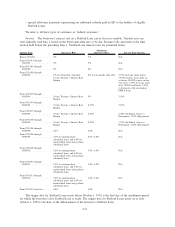 244
244 -
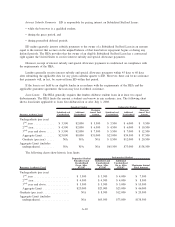 245
245 -
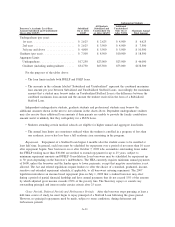 246
246 -
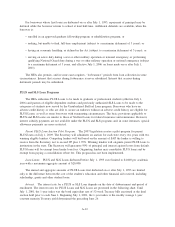 247
247 -
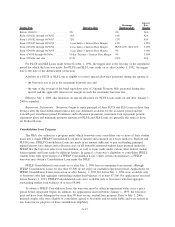 248
248 -
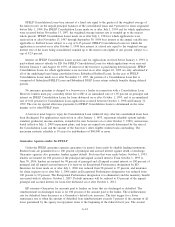 249
249 -
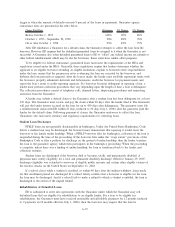 250
250 -
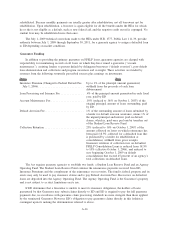 251
251 -
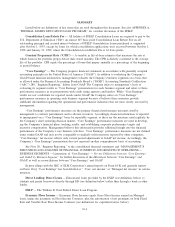 252
252 -
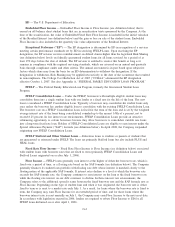 253
253 -
 254
254 -
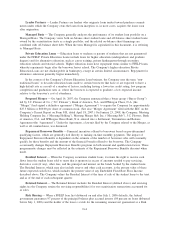 255
255 -
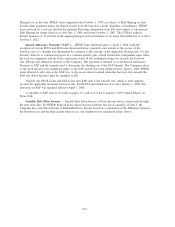 256
256
 |
 |
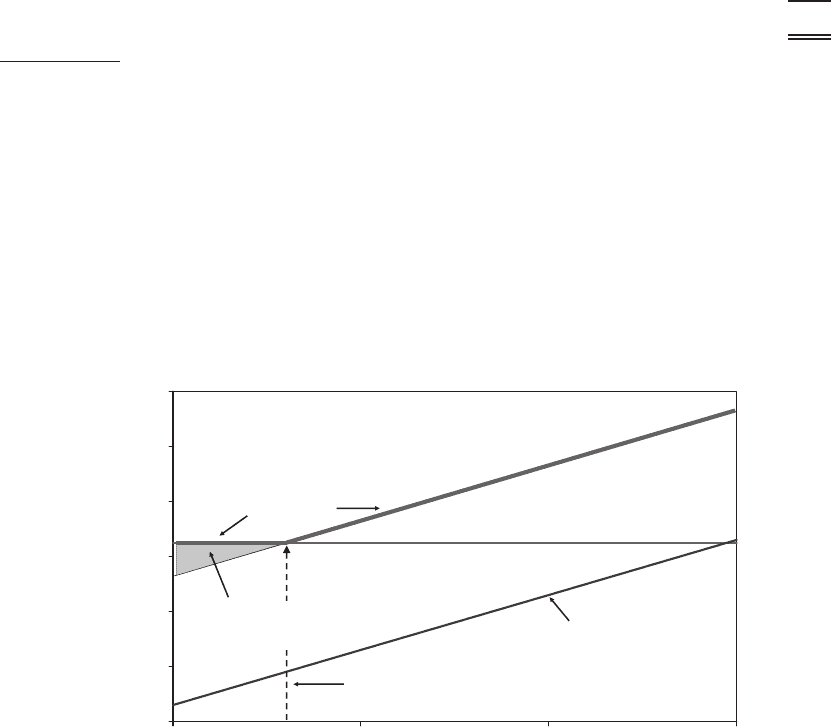
The following example shows the mechanics of Floor Income for a typical fixed rate FFELP Consolida-
tion Loan (with a commercial paper-based SAP spread of 2.64 percent):
Fixed Borrower Rate ...................................................... 7.25%
SAP Spread over Commercial Paper Rate ....................................... (2.64)%
Floor Strike Rate
(1)
....................................................... 4.61%
(1)
The interest rate at which the underlying index (Treasury bill or commercial paper) plus the fixed SAP spread equals the fixed
borrower rate. Floor Income is earned anytime the interest rate of the underlying index declines below this rate.
Based on this example, if the quarterly average commercial paper rate is over 4.61 percent, the holder of
the student loan will earn at a floating rate based on the SAP formula, which in this example is a fixed spread
to commercial paper of 2.64 percent. On the other hand, if the quarterly average commercial paper rate is
below 4.61 percent, the SAP formula will produce a rate below the fixed borrower rate of 7.25 percent and
the loan holder earns at the borrower rate of 7.25 percent.
Graphic Depiction of Floor Income:
4.00%
5.00%
6.00%
7.00%
8.00%
9.00%
10.00%
4.00% 5.00% 6.00% 7.00%
Commercial Paper Rate
Floor Strike Rate @ 4.61%
Lender Yield
Floor Income
Fixed Borrower Rate = 7.25%
Special Allowance Payment (SAP) Rate = 2.64%
Floating Debt Rate
Fixed Borrower Rate
Y
ield
Floor Income Contracts — The Company enters into contracts with counterparties under which, in
exchange for an upfront fee representing the present value of the Floor Income that the Company expects to
earn on a notional amount of underlying student loans being economically hedged, the Company will pay the
counterparties the Floor Income earned on that notional amount over the life of the Floor Income Contract.
Specifically, the Company agrees to pay the counterparty the difference, if positive, between the fixed
borrower rate less the SAP (see definition below) spread and the average of the applicable interest rate index
on that notional amount, regardless of the actual balance of underlying student loans, over the life of the
contract. The contracts generally do not extend over the life of the underlying student loans. This contract
effectively locks in the amount of Floor Income the Company will earn over the period of the contract. Floor
Income Contracts are not considered effective hedges under ASC 815, “Derivatives and Hedging,” and each
quarter the Company must record the change in fair value of these contracts through income.
Gross Floor Income — Floor Income earned before payments on Floor Income Contracts.
Guarantor(s) — State agencies or non-profit companies that guarantee (or insure) FFELP loans made by
eligible lenders under The Higher Education Act of 1965 (“HEA”), as amended.
G-3
